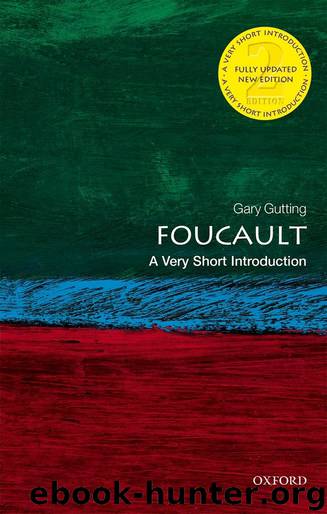Foucault by Gary Gutting

Author:Gary Gutting
Language: eng
Format: epub
ISBN: 9780192566546
Publisher: Oxford University Press
Published: 2019-07-30T00:00:00+00:00
From Descartes on, modern philosophy has been preoccupied with the question of whether our representations (experiences, ideas) accurately represent the world outside our minds. Descartes, for example, asked how we know that our ideas correspond to things that actually exist outside of us in space and time. Hume asked how we know that our experiences of regular associations of ideas (for example, the sun rising each new day) correspond to necessary connections in reality. Until Kant, no one had a plausible answer to these questions (though there were some persuasive suggestions, from Hume for example, that they needed no answer).
With Kant there occurred a decisive turn because he also reflected on the very possibility of representation, asking not just whether our representations are true to the world but how it is possible that we can represent anything at all (accurately or not). This was decisive because, he maintained, answering the new question provided a way of answering the old one. In particular, Kant argued that the very possibility of representing an object at all required, for example, that the object be represented as existing in space and time and as part of a network of causal laws. According to this kind of argument (which Kant called a ‘transcendental deduction’), the objects of our experience exist in space and time and are governed by necessary causal laws because otherwise they could not be objects of our experience. On the one hand, we are limited to knowing the world as we experience it (the phenomenal world), not the world as it is in itself (the noumenal world). On the other hand, this very limitation makes it possible for us to have objective knowledge of a world.
Kant’s view of knowledge requires a special dual status for human beings. On the one hand, we are the source of the necessary conditions for the possibility of any knowledge of the world: we belong to a ‘transcendental’ domain that is the source of all knowledge in the ‘empirical’ domain. But at the same time we are ourselves knowable (not only by experience but also by the social sciences) and so are objects in the empirical domain. Foucault uses the term ‘man’ to refer to human beings as having this peculiar dual status (as what he calls an ‘empirical-transcendental doublet’). He argues that, in this sense, there was no conception of man prior to the end of the 18th century. Hence his melodramatic declaration that, until the 19th century, ‘man did not exist’ (OT, 308).
In Foucault’s history of modern philosophy, man is the central problem, the difficulty being to understand how a single unified being can be simultaneously the transcendental source of the possibility of knowledge and just another object of knowledge. Chapter 9 of The Order of Things works through the major developments of 20th-century philosophy—particularly the phenomenologies of Husserl, Sartre, and Merleau-Ponty—arguing that none of them is able to develop a coherent conception of man. In every case, there is an illegitimate reduction: either of
Download
This site does not store any files on its server. We only index and link to content provided by other sites. Please contact the content providers to delete copyright contents if any and email us, we'll remove relevant links or contents immediately.
| African | Asian |
| Australian & Oceanian | Canadian |
| Caribbean & Latin American | European |
| Jewish | Middle Eastern |
| Russian | United States |
4 3 2 1: A Novel by Paul Auster(12362)
The handmaid's tale by Margaret Atwood(7744)
Giovanni's Room by James Baldwin(7313)
Asking the Right Questions: A Guide to Critical Thinking by M. Neil Browne & Stuart M. Keeley(5751)
Big Magic: Creative Living Beyond Fear by Elizabeth Gilbert(5739)
Ego Is the Enemy by Ryan Holiday(5406)
The Body: A Guide for Occupants by Bill Bryson(5067)
On Writing A Memoir of the Craft by Stephen King(4924)
Ken Follett - World without end by Ken Follett(4715)
Adulting by Kelly Williams Brown(4560)
Bluets by Maggie Nelson(4541)
Eat That Frog! by Brian Tracy(4509)
Guilty Pleasures by Laurell K Hamilton(4435)
The Poetry of Pablo Neruda by Pablo Neruda(4086)
Alive: The Story of the Andes Survivors by Piers Paul Read(4013)
White Noise - A Novel by Don DeLillo(3999)
Fingerprints of the Gods by Graham Hancock(3982)
The Book of Joy by Dalai Lama(3965)
The Bookshop by Penelope Fitzgerald(3839)
